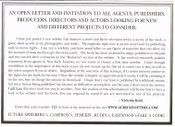All aspiring writers are desperate to get into print. That’s a given. I certainly was, but that was before the advent of POD vanity presses, which prey on the "I-want-it-now" impatience that afflicts so many aspiring writers these days. These aspiring writers just don’t want to invest the time and effort that’s a necessary part of shaping their voice, their skills and their careers. Bestselling Tess Gerritsen writes about that today:
What makes a new writer today think he should be immune to that
desperation I felt? What makes him think this is SUPPOSED to be easy?
What makes him think his very first book is going to get published — or
deserves to get published?
I’ve lost count of how many crappy novels I wrote before I got my break. Tess wrote three unpublished books before she finally sold her fourth. And she knows another writer who wrote seven books before finally selling her eighth.
Think of her desperation, her
hunger, to be published. It had to be there, driving her, or she would
have just given up. But she just kept going and wrote manuscript #8. And it sold. Think about that — writing seven books that don’t sell. Would you
have the persistence to start writing #8? Do you accept the fact that,
yes, there’s an apprenticeship involved in being a writer, a period of
training that you will be forced to undergo before you finally
understand what the craft is all about?No, it isn’t easy to get accepted by a publisher, and get paid for
your work. It’s a lot easier to whip out the checkbook and pay a
vanity press to print your manuscript.
That’s the real danger posed by these vanity presses — besides the emptying of a gullible writer’s bank account. The self-publishing companies are also robbing the writer of the experience that’s required to become a successful writer (and part of that is learning to deal with, and learn from, rejection). Too many aspiring writers fall for what appears to be "the easy way" — when, in fact, it’s not — rather than
accept the fact that their books are unpublishable and that they have a lot more work to do on their writing. They don’t want to work. They want a book now. Or at least the illusion of one. But it’s a career-sabotaging move…not to mention stupid and expensive.
And if you can just pay to get published, where’s the incentive to hone
your craft, to study your own work with a critical eye, to polish and
polish some more? Where’s the incentive to write books number seven
and eight and nine if each one is just going to mean you have to whip
out that old checkbook again to pay to see yourself in print?
There isn’t any. Sure, there are a handful of people who have found a measure of success self-publishing, but for the vast majority it is a financial sink-hole and a self-destructive mistake.
UPDATE 11-26-2006: Author Mat Johnson blogs about how the lure of vanity presses is ruining African-American fiction.
If I had hit my wall just three, or even two years later, all of those
self-publishing options would have been available to me. As desperate
as I was, I don’t know if I would have said no to the idea. I don’t
think I would have known to. At the time I was working on that book, I
actually considered it good enough to be published. I might have jumped
at any opportunity not to take "No" for an answer.[…]I saw a generation of black writers fall into this
trap, authors that could have been original voices that added to the
canon, who instead became literary canon fodder. They went pop, blew
up, and then almost instantly started vanishing, their worth dwindling
with their sales.Sadly, instead of working actively on getting better, many of this crew instead try to falsely justify the merit of their work.

